I'm very confused why this forum is still here if quests no longer exist.
Lies's forum posts
@wuddel: @draugen: @masterofpenguins_zell: @tru3_blu3: @pezen: Thanks for your attention and thoughtful responses. I posted this here on Giant Bomb because I thought it might resonate with the community here. Glad to see I was correct. Also glad to see some old faces are still around, those guys probably understand this piece more than most, having known me, in a sense, before.
Tru3_blu3, I'd urge you to take another look at the piece. Skill comes through practice, time, and dedication. To assume that everyone who has come before has some advantage over you is doing yourself a terrible disservice. You want to write? Write. Write about videogames, write about girls, write about pessimism. Write about whatever. It might be terrible, but you'll get better. Write until you can write. Climb until you can climb.
Don't worry about the falls.
@snide:
snide the previous guides system was amazing. You shouldn't feel bad as a facilitator when people are not smart or motivated enough to take advantage of a world-class toolset laid out in front of them. Admittedly it was constantly riddled with bugs ;)
This is likely the best solution to your woes, short of directly integrating with GameFAQs.
Those that pay attention know the community here matters and is respected. We very much appreciate it.
Happy holidays.
Sad to hear it Claude. You marriage lasted almost as long as I've been alive. That's something to cherish.
Glad to see you're getting along. I'm sure it takes a while and I'm sure it's tough but I'm also sure you'll come through it with a smile for the good times and some ridiculous comment or video ;)
Keep at it.
@Sweep said:
WHY DON'T YOU WRITE A GUIDE ABOUT IT, HUH, LIES?!?
Dick.
REMIND ME OF MY LOST LOVE MORE
Also there are still no guide quest so I mean what's the point? I should go yell at coonce for tha... now I'm sad.
But true story I've played two games this year and they were Mass Effect 3 and Alpha Protocol.
@Praxis said:
I think you're right that a lot of Mass Effect 3's failings can probably be traced back to BioWare being hamstrung by the sheer enormity of what they were trying to do, though I don't agree with some of the language you're using here. Calling Mass Effect a "loosely disguised Star Wars universe" is unnecessarily reductive, and saying that BioWare's "million dollar juggernaut was sold on a false premise" is a gross exaggeration. There's a big difference between failing to achieve what you set out to do and actively deceiving people.
Bioware certainly grew it in their own direction, but you can very clearly draw out the connection between Bioware's work on KOTOR and their work on Mass Effect. KOTOR was a universe they created almost wholecloth- despite it technically nesting in the existing SWU- but one they couldn't continue to play around in due to LucasArts. So they took their lessons, gathered some from other notable franchises starting with the word Star, and set out to make their own thing. Mass 2 and Mass 3 are considerably more unique in terms of presenting interesting corners of the universe, but the series has always worn its inspiration on its sleeve, I'd say. "Loosely disguised" is playing with hyperbole a bit, yes ;)
Mass Effect 3 has an entire game mechanic built around deceiving people into thinking their choices matter (War Assets [the flavor text in the War Assets is some of the best writing in Mass 3, btw]), and the marketing and PR leading up to the third (and second, to a lesser degree) game emphasized choice as well. It's a core tenet of the series. I'd argue intentions don't matter-- players bought in to mass Effect half a decade ago due to the promise of and hints at a continuous, evolving, interactive story that spanned a generation. I did, at least. I guess I shouldn't presume to speak for everyone, but I feel like my sentiments aren't uncommon.
Deceptive marketing isn't new or unique to Bioware in any sense-- this is just the first time I've ever seen it on such a large scale. And I find myself back to railing against scale. Didn't even mean to do that.
Yup, still on the scale kick.
Today let's consider two similar but separate games.
Mass Effect
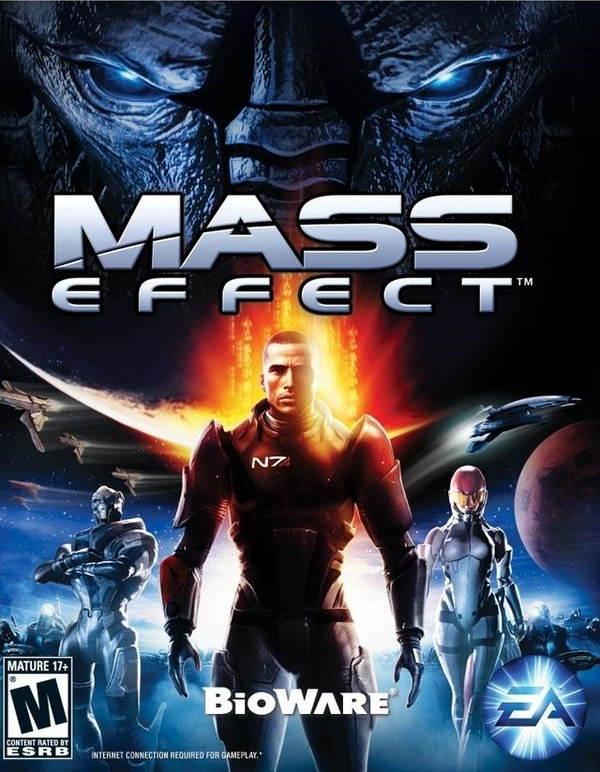
Bioware's loosely disguised Star Wars universe comes into being with several hundred thousands of words of backstory in the Codex, and a stats-based RPG combat system that looks deceptively like an action-based third-person shooter. The game is pitched from the start as an integral part of a trilogy, with the concept of choices that will carry over from one game to the next being undoubtedly the core of the pitch. It's an ambitious project to announce all at once, a project of a scale the videogame industry has not heard of before, and hasn't heard the equal of since. The game releases to critical acclaim on strong world-building, characters, and a memorable climax, despite gameplay that is considered unrefined by both RPG enthusiasts and shooter enthusiasts.
Alpha Protocol
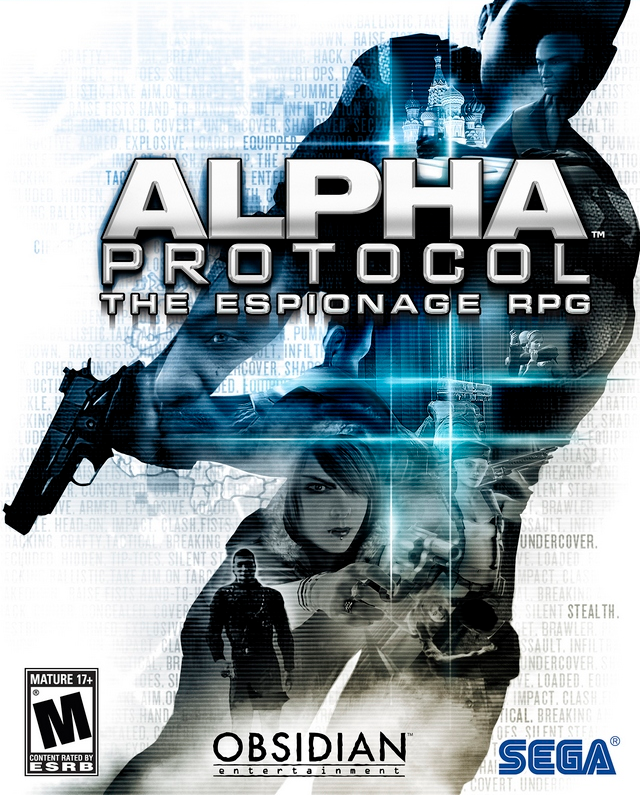
Continuing their recent trend of iterating and refining on formulas pioneered by RPG powerhouses, Obsidian Entertainment comes through shortly after the release of Mass Effect with a game that sounds strikingly similar to Mass Effect. A third-person espionage RPG with a stat-based action combat system of the type that looks like a typical third-person shooter but plays disturbingly unlike what you might expect, a focus on dialogue and character, and a promise that the actions of the player character will return to them in meaningful ways. Unlike Mass Effect, Alpha Protocol's game designers are contained to a single game to execute this vision. Alpha Protocol releases to middling reviews and little commercial success, and is widely considered a missed opportunity.
Sound Seriously Similar
So we've got two very similar products, designed and developed with similar mindset and ethos. The typesetting on the logos even looks similar. And yet, as we know, Alpha Protocol languished in obscurity while Mass Effect has launched a hundred-million dollar franchise that extends far beyond the reaches of our own personal medium, into toys and comics and anime and iPhones and on and on. But as any forum will tell you now, post-Mass Effect 3, Bioware didn't deliver on the initial promise and premise of the original game. In a wide swath of the gaming population festers a sense of being duped, or lied to.
There's some solid writing throughout the Mass Effect trilogy, no doubt, and even in the (recently) rather reviled third game, climactic moments such as Rannoch and Tuchanka stand out. But it's all rather pointless, as we know the story arc in its entirety now, and it's easy to see where the idealism behind Mass Effect was abandoned and the realities of modern game development encroached. Mass Effect succeeds in many areas, including "visceral" combat and interesting companions, but the soul of the project at its genesis- the core creative idea of the project- never really survived, because the scale of the project was such that it would simply be uneconomical to implement it. It's interesting that Rannoch and Tuchanka are the spots people tend to be brightest about that game, because those are the two spots where your decisions from previous games can actually affect the available outcomes. The soul of the original game peeks through at these points. The idea of choices with consequences comes through only twice in Mass Effect 3. In other areas people slot in and out if they are dead or alive, but that is not a consequence. The plot continues almost the same regardless. That is window dressing, and it's not what you were sold when you bought Mass Effect. Those are soulless changes.
Alpha Protocol has a soul. Alpha Protocol has a soul precisely because its developers were held accountable and forced to prove themselves first. Obsidian gave its developers one game. One nice tight package, any ideas or concepts they wanted in the game had to get in the game or go forever. Obsidian didn't have half a decade of releases to fill out. They had a game, and they delivered on the promise in a way Bioware never could. By limiting scale they were able to execute successfully on the core idea of their game.
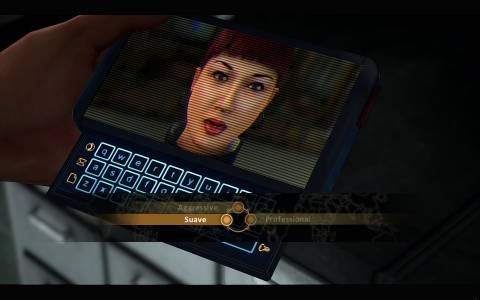
Alpha Protocol packs so many systems into such a short, solid game; it's actually kind of shocking how much variance there is in it. The heart of Alpha Protocol is the dialogue system: giving the dialogue system the teeth to actually affect things. The dialogue system in Mass Effect never gives you much of a chance to change anything beyond your paragon and renegade meters, with the exception of a few pre-set story beats. Alpha Protocol has no meters. Your actions result in consequences, sometimes immediate and sometimes considerably later. Think something is wrong with someone? Shoot them, blow your cover in the city, and miss that mission. Make a choice your handler doesn't like? Lose bonuses and find them less helpful in the future. Don't want to rescue the bitch who sold you out? Leave her alone and ride off into the sunset with your psychopathic buddy. Unable to make a decision quickly? It gets made for you, and you have to live with the results. Actually read the codex? Be able to use information from the dossiers in conversations. Accept the company line or toe it by asking questions? Alpha Protocol fractures out in some fantastic ways, and delivers on the initial premise of Mass Effect in a way that the trilogy never did.
Scale and business crippled Bioware almost from the start, but because of the very nature of Bioware's original idea, it was impossible to see how things would play out until we had the third game in our hands, by which point it would be too late. A clever model that was sold well, but not the best for delivering a quality piece of art or entertainment. Alpha Protocol failed commercially because it got messy, and it looked too much shooter and played too much RPG. Mass Effect always looked shooter, but as the scale widened the RPG elements narrowed, and they found massive commercial success, and critical too. But their million dollar juggernaut was sold on a false premise.
And Alpha Protocol delivers on that premise. So maybe next time you're looking forward to a huge ambitious project, consider if there isn't a smaller game that has already done it best.
Long time no see, Giantbomb.
I'm here to talk to you about The Elder Scrolls V: Skyrim, and why it is not the best game of the year, and why it fooled so many critics and consumers. I want to make it clear, because I know how, ahem, rational this debate can get, that I do not think you are a bad person or your opinion is wrong in any way if you enjoy Skyrim and think it was the game of the year. I think I understand why that's the prevailing opinion, perhaps I even understand it in a way you yourself have not considered. Perhaps you understand it in a way that entirely eluded me. Regardless, I believe we can peacefully coexist, and I simply ask you hear me out. I promise it'll be worth your time.

Videogames, as they mature and grow as an entertainment medium, and some would say an artform, are expanding exponentially in scope, to the point where seeing a statistic along the lines of say, "72% percent of households in America play videogames", actually does not inform you in any significant way, because of the myriad subcategories inherent. Cell phone games, smartphone games, educational games, console games, camera games, etc can all fall under the umbrella of videogames. And then there are the porous borders of the term: does Windows solitaire count? What about online poker? Scene-It? They're certainly games, displayed on video screens, and they react to player input. By all the denotative limits of the term, yes, they do count. But many a person would argue against their inclusion. The term "videogame" holds no inherent meaning nowadays to the general culture, other than as a broad umbrella. And so we see fracturing and categorization- the list I gave before. All videogames, all different enough to deserve a named category, without descending into enthusiast jargon. All these videogames, with their common heritage and characteristics, and herded apart and divided, mostly according to one thing: scale.
To our particular subculture-- which for shorthand's sake I'll call hardcore gamers (although I am certainly not ignorant of the connotation and conflict that surrounds the terminology, in this case simply consider it an easy way to separate the community that concerns itself primarily with console games and things like Game Of The Year awards from the unwashed smartphone and Wii Sports masses)-- the highest-level attribute of a videogame is its scale. Before platform, before developer, before influences, before even genre, the defining characteristic is scale. Scale, scope and ambition hold sway over the imaginations of our community. The much lauded "depth" of a game is a natural subset of this scale. A man more secure in his audience's attention might meander about whether that obsession is culturally-induced and what it reflects about our community, but for today, we'll simply content ourselves with the fact that it does, indeed, exist.
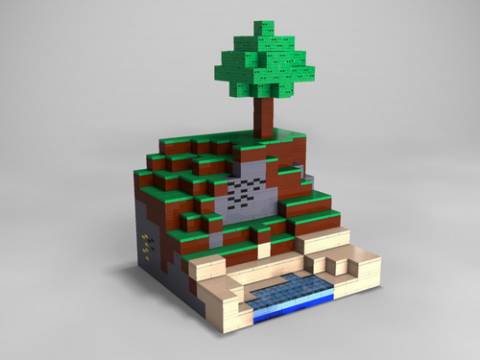
What's a "real game"? Skyrim's a real game; that's a statement you wouldn't find much challenge on. Kinectimals? Maybe there's a bit more discussion there. There's less to do, it's more of a virtual pet. It's a simulator. Is such a thing worth our time? There's no scale to the endeavor. Rayman Origins? By all accounts one of the most excellent, tight, creative and polished games to come out of a major studio in a while? Dropped to $19.99 already. Not near enough scale and perceived value in that project to survive in a retail market against a juggernaut like Skyrim. Forget about even trying to bring a portable game or a smartphone game into that discussion. Listening to the Giantbomb GOTY podcasts, watch for how quickly Patrick is shrugged off trying to insert Sword and Sworcery into the deliberations. Even to professionals, scale and scope are kings. It couldn't possibly match up. Minecraft? That's an interesting one: the potential for amazing scale is there, but the onus is on the player, not the developer. Thus it attracts a different audience, creators instead of consumers, and to consumers it has perhaps the least scope out of all of these. Minecraft is a blank page, not a completed manuscript. Minecraft is a LEGO set, not a cathedral (I think it's absolutely hilarious that they're making physical Minecraft LEGO, when Minecraft was pretty much a virtual LEGO set).
Look to our own wiki on Giantbomb: no flash games. No scope, no scale. No two-hundred person development team. Not notable.
So scale matters. It matters most, on a meta-level, to the categorization of games, and what we see is that the largest games, those with the most scope and scale and ambition become the games. They become the games that matter, they become the top ten games to look forward to in 2012, they become the future of gaming. They become, ultimately, the game of the year.
And I'm here to say: we are blind.
We Come To Skyrim
We come to Skyrim to drown ourselves in fantasy. We come to Skyrim to get lost. We come to Skyrim for the scale.
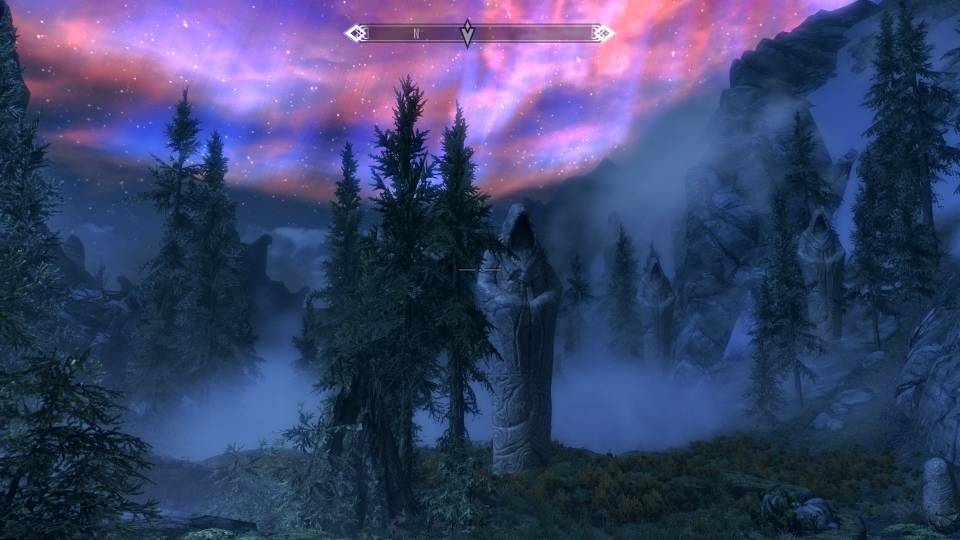
And here's what's so clever about Skyrim: it uses that scale to distract you from the fact that it actually spends a good 80% of it's time being a pretty mediocre first-person combat game. The role-playing elements are simply trappings: they hang around, colouring and contextualizing the combat in a clever display of sleight-of-hand. And the combat's simply not that good. Better than we've seen in Elder Scrolls previously, no doubt, but the combat in Skyrim is not by any stretch of the imagination, the strong suit of the game. Yet that is where the meat of the game lies, elements of story and world stringing you along from combat to combat. Combat is your only method of SIGNIFICANT interaction with the world of Skyrim. And herein is the issue.
The categorization of Skyrim as a role-playing game is almost disingenuous. I can't say it's a lie, but there's an element of tilt to the statement: it's an action game with extremely complicated and interactive interludes between levels. Which, ultimately, appears to be the direction the modern RPG is moving in, so perhaps I'm spilling words into an issue everyone already knows about. But for a game to get this level of acclaim solely for scale is ridiculous. What you spend your time doing in Skyrim is fighting. Fighting clunky controls and heavily scaling enemies. Sure, you have the option of fighting with magic or swords or archery, but none of those systems are as good as they would be if the scale of the game was less. Ultimately, I don't understand why we should praise Bethesda for managing to cram a bunch of mediocre gameplay systems into one game. Sure, it's an undertaking of impressive scale, but the scale doesn't excuse the mediocrity of the actual gameplay. If what you're doing for a good 80% of the game is simply average (if anyone here will argue that Skyrim's combat is great, I will fight you), does scale really excuse it?
According to Metacritic it does. And I don't know; it seems ridiculous to me. Am I crazy? Or are Bethesda just some of the greatest sleight-of-hand artists our industry has ever seen?

Log in to comment